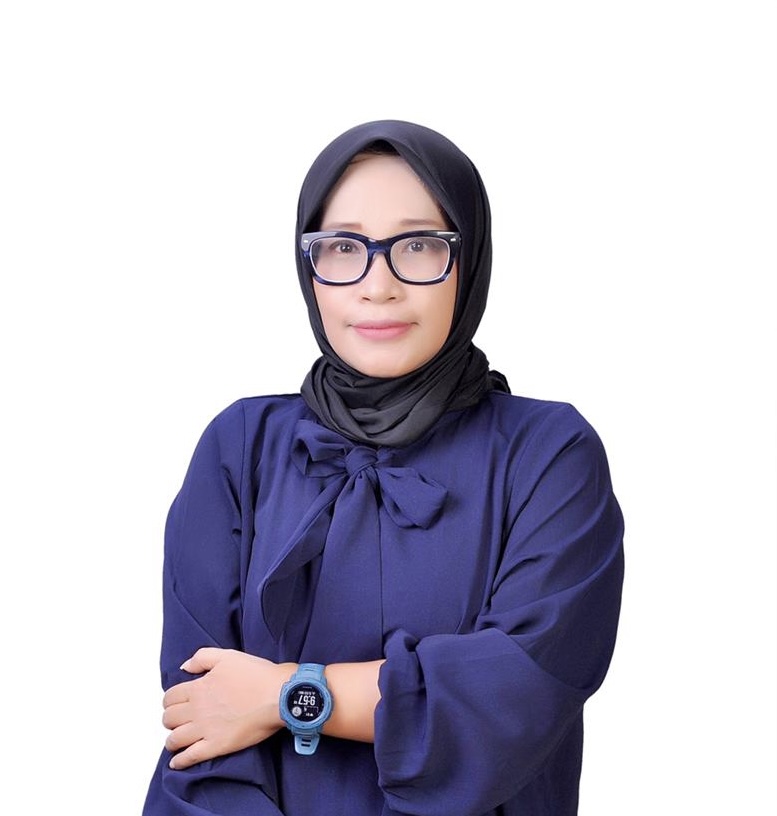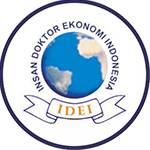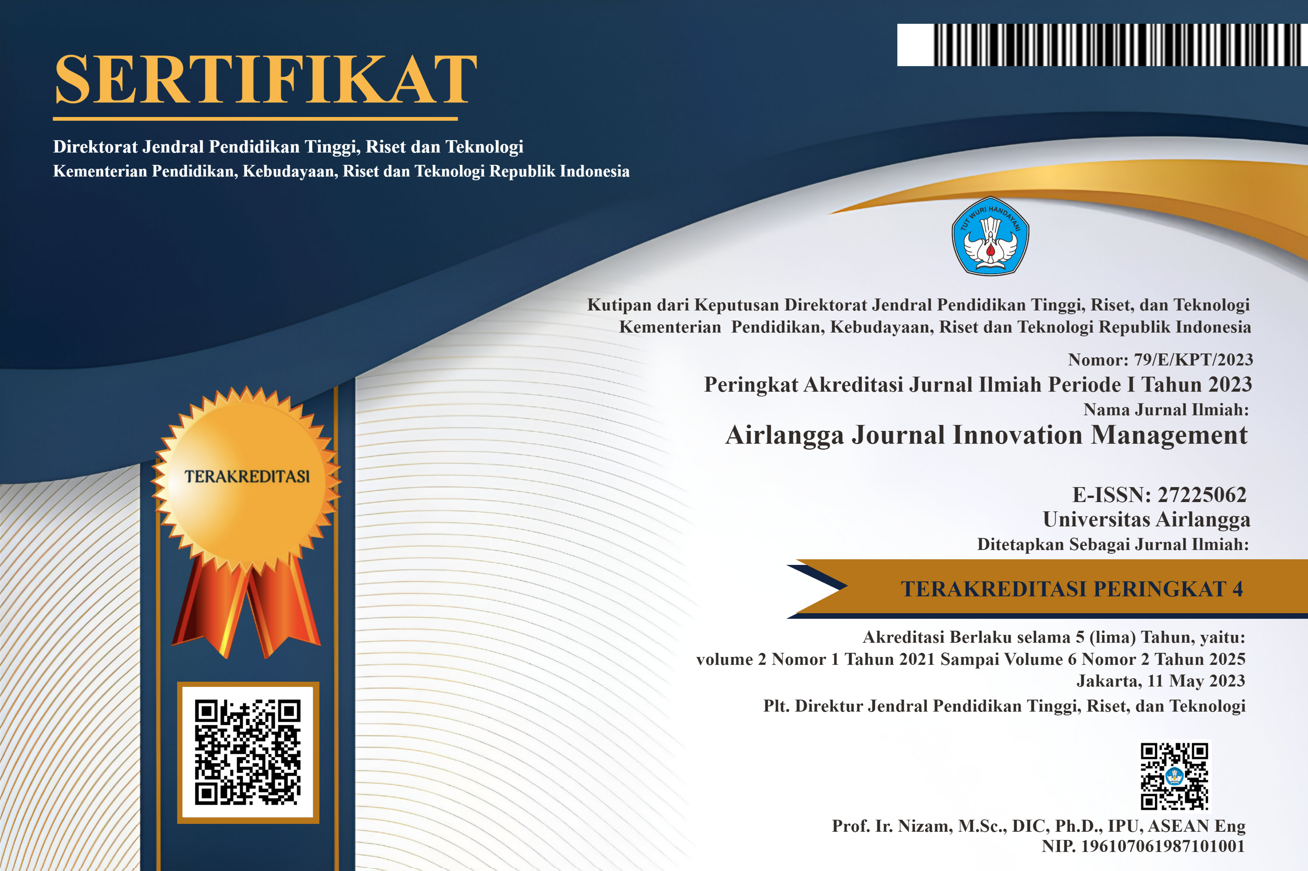The Impact of Islamic Financial Deepening on Economic Growth in Indonesia
Unduhan
Tujuan dari penelitian ini adalah untuk menguji pengaruh pendalaman keuangan syariah terhadap pertumbuhan ekonomi di Indonesia selama 2010-2017. Penelitian ini mencoba menjawab pertanyaan kritis: apakah pendalaman keuangan Islam mempengaruhi pertumbuhan ekonomi Indonesia? Penelitian ini menggunakan metode regresi berganda dengan data time series. Selain itu, penelitian ini menggunakan tujuh proxy pendalaman keuangan syariah, yaitu kedalaman kredit syariah kepada sektor swasta (Murabahah/GDP), kedalaman deposito (Deposito/GDP), kedalaman total aset (Total Aset/GDP), kedalaman kapitalisasi pasar saham syariah (ISMC/GDP), dept volume perdagangan saham syariah (ISTV/GDP), kedalaman obligasi pemerintah syariah (IGB/GDP), dept obligasi korporasi syariah (ICB/GDP), terhadap produk domestik bruto (PDB) sebagai proksi pertumbuhan ekonomi. Hasil penelitian menunjukkan bahwa pendalaman keuangan syariah secara simultan mempengaruhi pertumbuhan ekonomi sementara sebagian kedalaman kredit syariah, deposito, volume perdagangan saham syariah, obligasi pemerintah syariah berpengaruh signifikan terhadap pertumbuhan ekonomi; sebaliknya, total aset berpengaruh negatif terhadap pertumbuhan ekonomi, serta dept kapitalisasi pasar saham syariah dan obligasi korporasi syariah tidak mempengaruhi pertumbuhan ekonomi. Sebagian besar temuan ini konsisten dengan studi empiris oleh Ogbuagu (2017), Kagochi (2013), Afonso (2014) dan peneliti lainnya. Hasil penelitian ini dapat dianggap sebagai bahan kontribusi untuk mengembangkan instrumen yang lebih inovatif tentang pendalaman keuangan syariah untuk mendorong pertumbuhan ekonomi di Indonesia, terutama bagi pemerintah, penulis dan pemangku kepentingan.
Alam, A., Ratnasari, R. T., Mua'awanah, C., & Hamidah, R. A. (2022). Generation Z perceptions in paying Zakat, Infaq, and Sadaqah using Fintech: A comparative study of Indonesia and Malaysia. Investment Management and Financial Innovations, 19(2), 320–330.
Alam, N., Duygun, M., & Ariss, R. T. (2016). Green sukuk: An innovation in Islamic capital markets. In Energy and finance: Sustainability in the energy industry (pp. 167–185). Springer.
Amrullah, A. (2023). Determinants of Consumer Purchase Intentions on Halal Products. Airlangga Journal of Innovation Management, 4(1) 31-40 https://doi.org/10.20473/ajim.v4i1.46825
Ari, I., & Koc, M. (2018). Sustainable financing for sustainable development: Understanding the interrelations between public investment and sovereign debt. Sustainability (Switzerland), 10(11). https://doi.org/10.3390/su10113901
Fauziana, H., Wardhana, A. K., & Rusgianto, S. (2022). The Effect of Education, Income, Unemployment, and Poverty toward the Gini Ratio in Member of OIC Countries. Daengku: Journal of Humanities and Social Sciences Innovation, 2(2), 181–191.
Febriyanti, A. R., Ratnasari, R. T., & Wardhana, A. K. (2022). The Effect of Economic Growth, Agricultural Land, and Trade Openness Moderated By Population Density on Deforestation in OIC Countries. Quantitative Economics and Management Studies, 3(2).
Ghifara, A. S., Iman, A. N., Wardhana, A. K., Rusgianto, S., & Ratnasari, R. T. (2022). The Effect of Economic Growth, Government Spending, and Human Development Index toward Inequality of Income Distribution in the Metropolitan Cities in Indonesia. Daengku: Journal of Humanities and Social Sciences Innovation, 2(4), 529–536.
Hariz, F., Mezghani, T., & Abbes, M. B. (2023). Modeling dependence structure between green sukuk spread in Malaysia and the uncertainty factors before and during the COVID-19 pandemic. Journal of Islamic Accounting and Business Research.
Hirsanuddin, Rodliyah, & Minollah. (2021). Hybrid contract design in sharia banking product development. Journal of Legal, Ethical and Regulatory Issues, 24(Special Issue 1), 1–13. https://www.scopus.com/inward/record.uri?eid=2-s2.0-85112790597&partnerID=40&md5=e8965732431c783bac198e400893b363
Iman, A. N., Sukmana, R., Ghifara, A. S., & Wardhana, A. K. (2022). The Effect of Zakat Collection, Company Age, and Company's Total Assets on Financial Performance of Sharia Banking in Indonesia 2019-2020. Economic Education and Entrepreneurship Journal, 5(2), 217–224.
Islam, S., & Sultana, T. (2019). Practice of islamic financial management in Bangladesh: Evidence from islamic banks. International Journal of Islamic Banking and Finance Research, 3(1), 1–12.
Mendo, A. Y., Singh, S. K., Yantu, I., Hinelo, R., Bokingo, A. H., Dungga, E. F., Juanna, A., Wardhana, A. K., Niroula, B., & Win, T. (2023). Entrepreneurial leadership and global management of COVID-19: A bibliometric study. F1000Research, 12(31), 31.
Naeem, M. A., Raza Rabbani, M., Karim, S., Billah, S. M., Rabbani, M. R., Karim, S., & Billah, S. M. (2023). Religion vs ethics: hedge and safe haven properties of Sukuk and green bonds for stock markets pre-and during COVID-19. International Journal of Islamic and Middle Eastern Finance and Management, 16(2), 234–252.
Pratiwi, A. C., Wardhana, A. K., & Rusgianto, S. (2022). Application of Vector Error Correction Model on Macroeconomic Variables toward Changes in the Composite Stock Price Index. Daengku: Journal of Humanities and Social Sciences Innovation, 2(2), 219–229.
Qosim, N., Ratnasari, R. T., Wardhana, A. K., Fauziana, H., & Barkah, T. T. (2023). Eight Years of Research Related to the Green Sukuk in the Global Stock Exchange Market to Support the Implementation of SDG: A Bibliometric Review. Journal of Islamic Economic and Business Research, 3(2), 161–180.
Rahman, A., Ahmad, A. U. F., Bin-Nashwan, S. A., Muneeza, A., Abdul Halim, A. H., & Markom, R. (2023). Policy approach adopted for issuance of Green Sukuk: is priority given to priority needed areas? Journal of Islamic Accounting and Business Research.
Rahman, I., Ratnasari, R. T., & Wardhana, A. K. (2022). Effect of Certificate of Bank Indonesia Sharia and Indonesian Bank Seven Days Repository Rate to Inflation Ratio in Indonesia During Covid-19 Pandemic. Economic Education and Entrepreneurship Journal, 5(1), 157–174.
Amijaya, R. N. F., Prassetyo, A. E., Pratama, R. Y. and Kharisma, I. W. (2023). Does Islamic Finance Matter for Poverty Development in Indonesia? Airlangga Journal of Innovation Management, 4(2), 185-197. https://doi.org/10.20473/ajim.v4i2.49756
Ryandono, M. N. H., Permatasari, S. A., & Wijayanti, I. (2019). Business behavior in an islamic perspective: Case study of muslim woman entrepreneurs in Ikatan Wanita Pengusaha Indonesia (IWAPI). 12th International Conference on Business and Management Research (ICBMR 2018), 154–159.
Ryandono, M. N. H., Wijayanti, I., & Kusuma, K. A. (2020). Determinants of Investment In Islamic Crowdfunding. Muqtasid: Jurnal Ekonomi Dan Perbankan Syariah, 11(1), 70–87.
Syarofi, M., Putri, L. 2023. The Importance of Sharia Supervisory Board on Islamic Financial Institution. Airlangga Journal of Innovation Management, 4(1) 74-83. https://doi.org/10.20473/ajim.v4i1.45357
Wardhana, A. K., & Ratnasari, R. T. (2022). Impact of Agricultural Land and the Output of Agricultural Products Moderated with Internet Users toward the Total export of Agricultural Product in Three Islamic South East Asian Countries. Iqtishodia: Jurnal Ekonomi Syariah, 7(2), 11–20.
Wijayanti, I., Herianingrum, S., & Ryandono, M. N. H. (2020). Islamic Crowdfunding Mechanism to Answer Renewable Energy Investment Challenge in Indonesia. Test Engineering and Management, 83, 3596–3605.
Wijayanti, I., & Ryandono, M. N. H. (2020). Zakat institutions' mustahiq transformation in developing countries: Comparison study. Opcion, 36(S26), 350–366.
Wijayanti, I., Ryandono, M. N. H., & Petra, D. H. S. P. H. (2021). Financial Inclusion through Zakat Institution: Case Study in Indonesia and Brunei Darussalam. International Journal of Islamic Business and Economics (IJIBEC), 5(2), 128–140.
Zakik, Z., Kamil, A., Prasetyo, A. S., Ryandono, M. N. H., & Wijayanti, I. (2022). Economic development on Madura Island through halal tourism: A business feasibility study. Al-Uqud: Journal of Islamic Economics, 6(2), 289–303.
Hak Cipta (c) 2024 Airlangga Journal of Innovation Management

Artikel ini berlisensiCreative Commons Attribution-NonCommercial-ShareAlike 4.0 International License.
- The journal allows authors to hold copyright without restrictions and retain publication rights without restrictions. The author retains the copyright and grants the first publication rights to the journal, with his work simultaneously licensed under the Creative Commons Attribution-NonCommercial-ShareAlike 4.0 International License (CC BY-NC-SA). This license allows others to share the work with acknowledgment of authorship and initial publication in this journal, provided that the work is not used for commercial purposes and that any derivative works must use the same license.
- Authors may enter into additional contractual agreements for non-exclusive distribution of the journal publication version (e.g., uploading it to an institutional repository or publishing it in book form), while still including acknowledgment of the initial publication in this journal.
- Authors are allowed and encouraged to upload their work online (e.g., in an institutional repository or personal website) before and during the submission process. This can support productive scientific exchanges as well as increase citations to published works.

AJIM by UNAIR is licensed under a Creative Commons Attribution-NonCommercial-ShareAlike 4.0 International License.





















